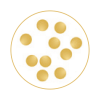Antibiotics and the Development of the Intestinal Microbiota
Is your baby sick? If your healthcare professional has prescribed antibiotics to him/her, he/she has a bacterial infection.
Antibiotics are effective in fighting bacterial infections, by destroying and/or limiting the growth of bacteria1.
Some children may develop diarrhoea after taking antibiotics. This occurs in children in around 10% of cases, and more often in children under 2 years of age2. This diarrhoea is a short-term manifestation of microbiota imbalance.
What is microbiota imbalance?
The intestinal microbiota is the totality of bacteria colonizing your child’s intestine. It is established at birth and develops until the age of 33. A balanced and healthy microbiota is essential to your child’s health.
Antibiotic treatments are used to destroy bacteria which cause infections, but they can also destroy some or all good bacteria in the intestinal microbiota4.
Rebalancing the intestinal microbiota is key to managing antibiotic-associated diarrhoea2. Breast milk provides ideal nutrition in this case.
It contains in fact:

Probiotics: These are bacteria that contribute to the good health of the child5

Prebiotics: These are sugars that are not digested by the body and which feed good bacteria in the intestine, allowing them to develop more easily6

The probiotics and prebiotics in breast milk act in synergy to strengthen your baby’s natural defences and intestinal microbiota.3
If your baby is not breastfed, do not hesitate to consult your healthcare professional.
- https://www.pasteur.fr/fr/centre-medical/fiches-maladies/resistance-aux-antibiotiques consultée en juin 2020
- GFHGNP. Prévention de la diarrhée associée aux antibiotiques – Septembre 2019
- Worepeis H., et al, The first thousand days – intestinal microbiology of early life : establishing a symbiosis, Pediatr Allergy Immunol, 2014; 25:428-38
- Shamir R, van Eldburg Knol J Duponent C (eds). Gut health in Early Life: Signifi cance of the gut Microbiota and Nutrition for Development and Future Health 2015; John Wiley and Son, West Sussex, UK.
- Jeurink PV. Et al., Human milk: a source of more life than we imagine. Benef Microbes. 2013;4:17-30
- Ballard O, et al., Human milk composition: nutrients and bioactive factors. Pediatr Clin North Am 2013;60:49-74
BA20-516


